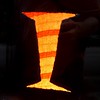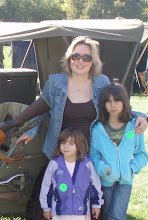
Wednesday, December 10, 2008
LIS 635 Final Project

Sunday, December 7, 2008
#23 Summarize
What were your favorite discoveries or exercises on this learning journey?
I liked all of them in one way or another. Even those that were not my favorites were good because they expanded my awareness or appreciation of various applications. My favorite part of this exercise was the blog itself. I really enjoy this format. It is both practical and fun.
Were there any take-aways or unexpected outcomes from this program that surprised you?
What could we do differently to improve upon this program’s format or concept?
Tuesday, December 2, 2008
Aloha

Monday, December 1, 2008
#22 NetLibrary

#21 Podcasts

Hulu?! Anybody out there?
#20 You Tube
First, I just have to say that I love Arthur! I love the books, the PBS cartoon show, just the name "Arthur" is great! Even if I didn't have kids who watched Arthur, I would still watch it occasionally because the plots actually have several layers of depth to them with humor and literary allusions for adults (education-wise, not content-wise!). And I hate to admit how many times my three kids and I have danced in our living room to "Having fun isn't hard when you've got a library card!" But, on to You Tube . . .
The name You Tube is clearly a pun on the slang term "Boob Tube" and no more apt a moniker was ever coined. You Tube is at the center of the Internet time-sucking vortex and is filled with tons of narcissistic garbage. That said, it is also home to a lot of great content including humorous, educational and moving videos. I like searching favorite songs and seeing the videos other people have created (usually photo montages). You Tube is also a great space for family and friends to share video long distance. WE have numerous friends and family who post binkie's first steps or tot's first drum set and then send us a link. It's a nice way to stay in touch.
Does You Tube have any serious applications for library use? I struggle to come up with anything truly earth-shattering! It would be fun for a teen group at the library to create videos for other teens telling what they love about the library and then post it on the teen spot on the library website. Or how about a several session teen program where they create a murder mystery mini movie (m4!) set in the library? Staff training videos could be created or some sort of fun video that is on the library's website that welcomes patrons and sets the tone for an interactive, enjoyable library experience? You know, because HAVING FUN ISN'T HARD, WHEN YOU'VE GOT A LIBRARY CARD!!!
#19 Web 2.0

#18 Online Productivity
I had never heard of Zoho prior to this assignment, but I do regularly use open access software. We have Open Office which came out of a combination of naivety and necessity. Last year we got a great deal on a new computer. Our old computer was so ancient that it was running on Windows 98 which might explain why we were so out of the loop on the fact that new computers, especially bargain ones, don't come preloaded with software like Microsoft Office Suite. When we realized this (and the fact that without Microsoft our brand new computer was a pretty spectacular paper weight!) we were stunned to discover the cost of software. On our tight budget, which was blown by the bargain computer, we could not afford anything more. This is where my frugal techie brother came to the rescue and told us about Open Office. What an awesome product -- and all for free. Now that I also know about Zoho and Google Docs, I don't know why anyone drops that kind of coin on Microsoft products when equally useful, user friendly alternatives exist. (Plus it feels kind of fun to stick it to "the man.")
For this assignment, I used my Google account to open a Zoho account which took about twenty seconds -- EASY! Then I typed this document and posted it directly to my blog as a draft, double checked the formatting and published it. Nothing could have been easier. I also checked out Google Docs which was also accessible via my existing Google account. I like the seamless interactions between applications and the ease of use of both word processors. They are completely navigable by anyone familiar with any other word processor. I am looking forward to using the presentation (Power Point counterpart) applications as soon as I have a reason! As the economic downturn continues to be an unwelcome guest at the table, it will be interesting to see if more and more people turn to open access software options. I see only exponential growth in their future.
Sunday, November 23, 2008
#17 PBWiki

Or since this exercise was called a "sandbox" (as in "let's play around and have fun"), the experience could also be put this way:
As advertised:
As experienced:
#16 Wide World of Wikis!

Thursday, November 6, 2008
#15 Web 2.0, Library 2.0 & the Future of Libraries
Wednesday, November 5, 2008
#14 Technorati
The Technorati Monster:
As an aside, can I just say that almost every time I try to type the word "blogs," I type the word "clogs" instead? This only happens when I am typing the plural form of blog and must be related to the fact that I am half Swedish!!!
Tuesday, November 4, 2008
Thursday, October 30, 2008
#13 Del.icio.us
 Yum. Again, Del.icio.us is something I have been meaning to do for some time, but never found "some time." The budding librarian in me gets a little overwhelmed at the possibility of the variety of tags one could use. I typed a simple "frugal-living" tag for a blog I follow, then looked to see what others had tagged: cooking, coupons, recipes, frugal, budget, food, frugality. This is from just a little blog that only 25 people have tagged. Others are even more crazy. As Vonnegut was so fond of saying, "So it goes."
Yum. Again, Del.icio.us is something I have been meaning to do for some time, but never found "some time." The budding librarian in me gets a little overwhelmed at the possibility of the variety of tags one could use. I typed a simple "frugal-living" tag for a blog I follow, then looked to see what others had tagged: cooking, coupons, recipes, frugal, budget, food, frugality. This is from just a little blog that only 25 people have tagged. Others are even more crazy. As Vonnegut was so fond of saying, "So it goes."#12 Rollyo
#11 Library Thing
Tuesday, October 28, 2008
Hey, Chicago, What Do You Say?



And to keep it all literary and relevant, here are a couple of titles we can add to our collections:

And my favorite children's selection:

Excuse me. This brought back all of those terrible feelings I had buried until next season. I'm leaving now to go have a good cry. I hate being a Cubs fan sometimes. . . .
Saturday, October 25, 2008
Living Library

Tuesday, October 14, 2008
#10 Play Around with Image Generators
 Using BabyMaker 3000, I used this exact picture, isolated our faces and uploaded us. Here is the baby generated:
Using BabyMaker 3000, I used this exact picture, isolated our faces and uploaded us. Here is the baby generated: It is a lot better than I thought it would be! I was expecting more along the lines of what Conan O'Brien does! Cute, but my real babies are still way cuter!!! And then here is another one I tried for comparison from Make Me Babies. This site allows you to choose celebrities as well, which I guess is supposed to be fun for some people. . . .
It is a lot better than I thought it would be! I was expecting more along the lines of what Conan O'Brien does! Cute, but my real babies are still way cuter!!! And then here is another one I tried for comparison from Make Me Babies. This site allows you to choose celebrities as well, which I guess is supposed to be fun for some people. . . . Frankly, most of these just creeped me out, but a site that I thought was awesome and that had some possibilities for librarians was Letter James. They offer all kinds of standard images that can then be personalized like the two below. They offer calendars too, which would make great gifts. For libraries, their images could make excellent publicity or signage as easy as just typing in some text, saving and printing. Awesome!
Frankly, most of these just creeped me out, but a site that I thought was awesome and that had some possibilities for librarians was Letter James. They offer all kinds of standard images that can then be personalized like the two below. They offer calendars too, which would make great gifts. For libraries, their images could make excellent publicity or signage as easy as just typing in some text, saving and printing. Awesome!

Please note that the graffiti is the work of an amateur tagger (of the "old skool" variety)! I had no idea what pithy statement to write . . . And the "Go Cubs!" is rather sadly very belated. There's always next year. . . .
And lastly, there are literally thousands of name generators out there, but one fun one was the Hip Hop Name Generator. My Hip Hop name is Tha Notorious La Vida Loca. I want a nametag for work with that on it. You know, building rapport and all that.Monday, October 13, 2008
#9 Finding Feeds
I resorted to some more "primitive" methods of Internet searching, namely Google, previously bookmarked library-related sites and links to other sites from library sites to add to my RSS feeds. I follow a few library blogs regularly. Shifted Librarian is not one of them. I think I am one of the only people in Library Land who just isn't over the moon in love with SL. Actually, one blog that I really like is from a classmate. Her site The Library Student is very relevant with storytime themes and ideas, children's book reviews and annotated book lists. I also added Library Stuff and Librarian.net. Good stuff, although that giant sucking sound keeps getting louder. . . .
#8 RSS and Newsreaders

#7 Blog about Technology
Saturday, October 11, 2008
#6 Flickr Mashups




Flickr has an Open Interface Application (API) which just means that anyone can write a program to utilize or present Flickr data. In fact, they encourage it! There are entire websites devoted to toys, gadgets, widgets and applications for Flickr pictures (or is it pictrs?). I made the above picture with Spell with Flickr. The best part was that it was totally easy. Just type in the word, click a button and out pops some awesome letters. If you don't like the letters, click on each one for a zillion other choices.
 Here is my son as a pop art icon. This can be done at the Wharholizer. I have wanted to do this for years, and have tried doing it more "by hand," but still with digital pictures. It is amazing that a simple upload of a picture and the click of one button could accomplish this! So while finding the applications and navigating Flickr and its incredible amount of content is overwhelming at the start, the mashups applications could be real time-savers once one becomes familiar with them.
Here is my son as a pop art icon. This can be done at the Wharholizer. I have wanted to do this for years, and have tried doing it more "by hand," but still with digital pictures. It is amazing that a simple upload of a picture and the click of one button could accomplish this! So while finding the applications and navigating Flickr and its incredible amount of content is overwhelming at the start, the mashups applications could be real time-savers once one becomes familiar with them.

We found the above creature living in a messy habitat near our home. There may be more; scientists are continuing to excavate. Magazine covers can be generated at this page by Big Huge Labs. I found Big Huge Labs' page to be one of the easiest pages to find, navigate and use.
Now, to put all of this in a library frame of reference. . . . In terms of how libraries and librarians could use all of these applications, I am in a bit of a quandry. There are the obvious ideas of using these for marketing materials, generating your own staff "READ" posters and creating pretty impressive content for library web pages and blogs. I think well-versed staff would also be helpful in teaching these applications in either a program setting or more informally as patrons ask. Beyond that, I am curious to see what other classmates come up with.
Wednesday, September 24, 2008
Flikr Lurkr
Tuesday, September 23, 2008
#5 Explore Flikr
I usually use Shutterfly for my online photo "stuff" and found Flikr a little bit harder to navigate. Although, it does look like I will be able to do more with Flickr than Shutterfly once I get the hang of it. I did use the red-eye feature on the dog and guinea pig pictures, and it was easy!
The introduction slideshow/tutorial to Flikr was very helpful, but it made using Flikr look a lot easier than it really is. I think it's like anything else, you have to learn a new "lingo" and how to get around and then you'll be fine.
The sheer volume of options is a little overwhelming, but also inspiring. The creative applications really make me want to do something artistic with some of my pictures (not any of the ones I have shown here!) The slideshow above is just a few goofy moments from the past couple of months around the ZamFam house. Pets and kids. What could be better?
And Luna is a "Caymanian Water Hound" which is to say a mutt I got at the Human Society in the Cayman Islands when I lived there. She was one hour away from being euthanized, weighed only four pounds and was covered in raw, open wounds and cigarette burns. Sometimes in January, I feel bad about bringing her to the Great White North (no more beach runs!), but I figure the alternative was much, much worse!
Addendum:
The feature to embed the html code did not work to get my slideshow on my blog, so I looked at Beth's blog, entered pictobrowser.com via her blog and embedded with no problem. This was very frustrating though! I'm not sure if the problem was on the Flikr end of things or Blogger's.
Tuesday, September 16, 2008
#4 Register Your Blog
Acronym Power!
And just for Beth: "FRBR"

#2 Being a Lifelong Learner

 According to our tutorial, there are 7 1/2 habits of lifelong learners. Here's my paraphrase:
According to our tutorial, there are 7 1/2 habits of lifelong learners. Here's my paraphrase:

#1 of Twenty Three Things

I'll try to have fun along the way. Frankly, life is too short (and too busy) to not try to make the journey amusing.
Sunday, September 7, 2008
But I Mean It With the Utmost Respect. . .
I enjoy writing and find it the best way to order my thoughts and synthesize what I learn, so I am looking forward to this foray into library blogging. Welcome aboard.
I thought about introducing myself in this first post, but frankly, I think the only people really interested in all of my particulars are me and . . . mostly just me. So why bore you? When I have something scintillating to share from the library universe, I'll post it here. That would be much more satisfactory, I think. Only item that might be pertinent, but probably not, is that I am an Anglophile and Francophobe. I can't help it. I was born that way -- kind of like being a Cubs fan. Seriously, do you think anyone would choose that kind of heartache (being a Cubs fan, I mean. The Francophobe is much more logical . . .)? Spoken with tongue firmly in cheek. . .
Peace to all until next time. . .




